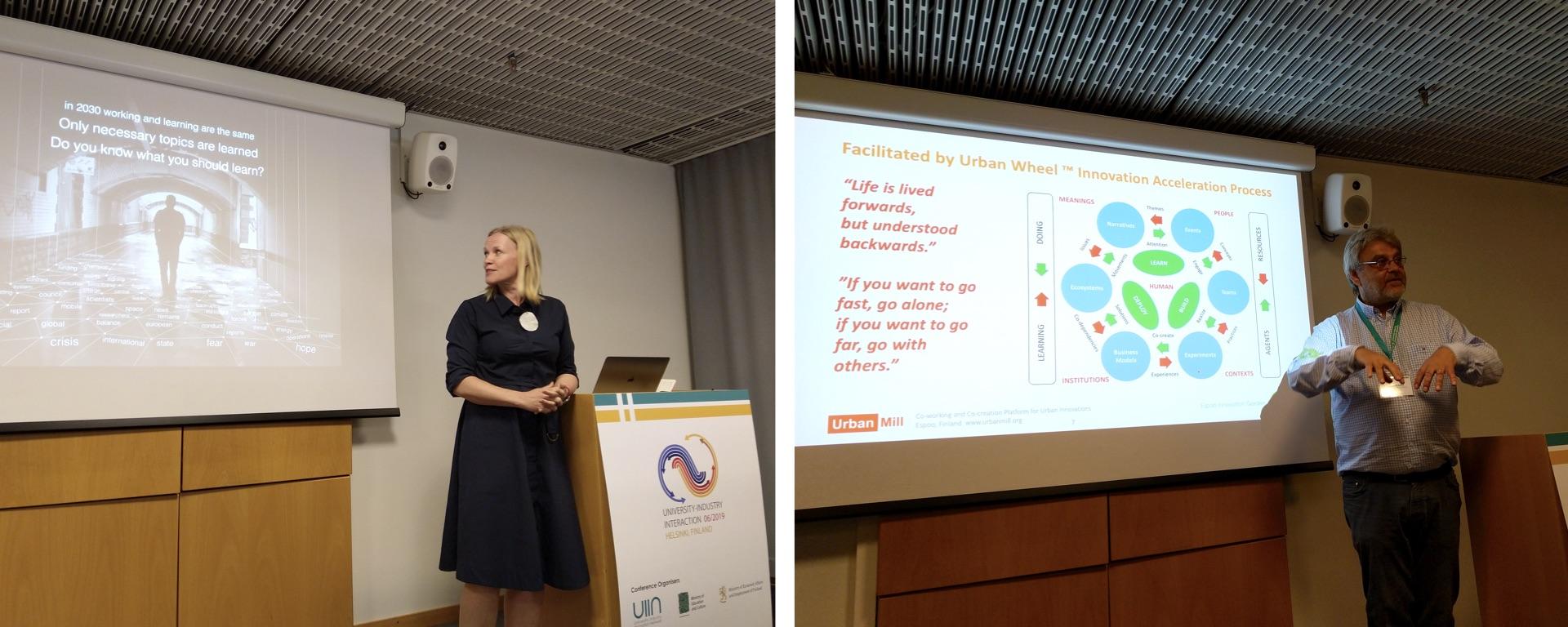Sunny Helsinki on June 18-20 was the host city of 2019 University-Industry Interaction Conference. Event gathered +500 experts from +250 organisations and over 60 countries in Finlandia Hall to create future of universities and university-business-cooperation. Alvar Aalto’s building provided a suitable venue for this group of experts to share insights, learn together and formulate new projects.
Mikko Korpela and Toni Pienonen are two veterans of this work and University Industry Innovation Network (UIIN). Here are our insights and observations from the event.
FIVE ELEMENTS OF FUTURE UNIVERSITY-BUSINESS-COOPERATION
The CEO of UIIN, Arno Meerman, launched the Helsinki conference with a short keynote where he presented some elements of future UBC. His keynote was a summary of The Future of Universities Thoughtbook (download PDF via link).
From the point of view of university-business-cooperation, the universities of the future can be seen as . . .
- Talent-Engines: Developing and validating students’ competences. Role of universities would be to prepare students for an employable future. Whether it is entrepreneurship in any form or being an employee. This means heavy engagement with business in the curriculum design and delivery. At Crazy Town, we are developing our own talent programs where universities can be part of. It is also interesting to remember that learning takes place everywhere, e.g. at work and professional communities such as Crazy Town. As such, in the future it will be the job of universities to validate this informal learning.
- Life Partners: Adding or scaling the skills of professionals. The notion of the ‘students’ will become diversified to support the personal and professional growth of people. This way studying can genuinely be seen lifelong journey – students never leave the university.
- Discovery; where cutting edge visionary and collaborative research occure. This already happens but in the future the competition will be tougher. The key is to find ways to create, exchange and develop knowledge with the society and business more effectively and openly.
- Home-base: Open co-working exchange space for the region. The role of this mission is to operate as an ‘home-base’ for initiatives. Important thing is to link regional resources for the action. This is the core of Crazy Town. We connect the dots and enable success for the ecosystem.
- Launch-pad: Entrepreuneurial base for students, academics and business. This way universities can operate as a launching pad for new business creating opportunities for all to conceive, test, launch and scale their operations. Eg. university spin-outs, promising student start-ups, supporting regional scale-ups etc. The role is to provide an ideal supporting environment for new ventures to fight off competitors.
PAY ATTENTION TO PEOPLE AND BOTTOM-UP CULTURE
Keynotes by representatives of Kaospilot (Denmark) and CODE (Germany) demonstrated examples of future-oriented universities. Both emphasized that rethinking education stems from people. Individuals seek meaningful ways to impact society. It is up to the universities to harness this desire. Soft skills, such as learning how to learn and collaborate are increasingly more important.
Peter Vesterbacka explained how Finnish startup scene was facilitated by bottom-up movements and examples set by Slush and student-driven entrepreneurship societies. They dared to be different. Role models and peer examples encouraged others to join the story.
A popular topic in coffee break discussions was that most universities across Finland and Europe struggle with how to make their organizations more entrepreneurial and how to get staff members engaged with industry. Most common observations were that i) Change needs to start with the individuals; ii) People need to be brought together and helped to perceive possibilities and the societal impact of UBC; and iii) Building a bottom-up culture needs systematic approach. Stories, peer-examples and role models help in this task.
We came to similar findings, when we did a study on UBC in Finland.
”JOBS WILL BE LOST, SKILLS ARE FOREVER” – ANU PASSI-RAUSTE
All these thoughts were also echoed in a panel discussion at the conference involving Toni from Crazy Town, Anu Passi-Rauste from Headai and Kari Mikkelä from Urban Mill.
Headai’s technology can help individuals and organizations to continuously learn new skills as well as find learning, collaboration and work opportunities. Urban Mill platform on the other hand shares much of the DNA with Crazy Town. They work with an impressive number of regional development initiatives, in the center of their activities is the individual human.
Anu and Kari presenting

International delegates asked from our panel, if our approaches are transferable outside the Finnish context. We surmised that perhaps the high-level of trust in Finland and Nordic countries makes it easier for us to start doing something like this, but the basic tenets of human behaviour are universal. ”Ecosystems” are people interacting with one another.
CRAZY TOWN BUILDS ENTREPRENEURIAL COMMUNITIES THAT LEARN TOGETHER (AND COOPERATE WITH UNIVERSITIES)
UIIN conference gave Mikko and Toni affirmation that Crazy Town is on the right track and future-proof.
Next autumn, we launch a ”Campus Crazy Town” at a Finnish university campus with a partner. At this stage we sadly cannot reveal more, but in a nutshell, we bring the Crazy Town way of (co)working in middle of a university campus.
Following the conference, we listed five ingredients that we have to take into account when nurturing our new location:
- It starts with people first
- With the people, we build a bottom-up culture
- This leads to a community that cooperates together
- Cooperation supports continuous learning
- Our space needs to facilitate and make this as effortless as possible, but is at best of secondary importance
Mikko Korpela, +358 400 499 242
Toni Pienonen, +358 400 737 238
(In addition to running Crazy Town communities, we also train and consult universities and regional developers, so don’t hesitate to ask if any of these topics are of interest to you)
